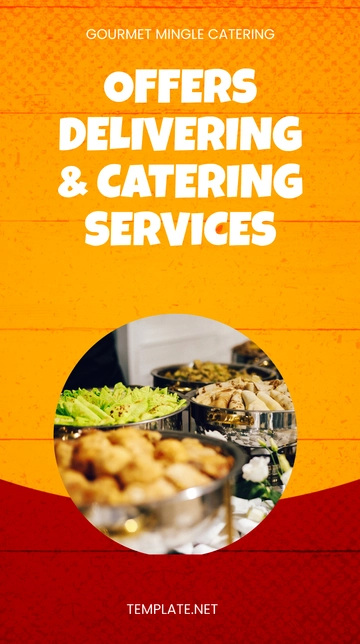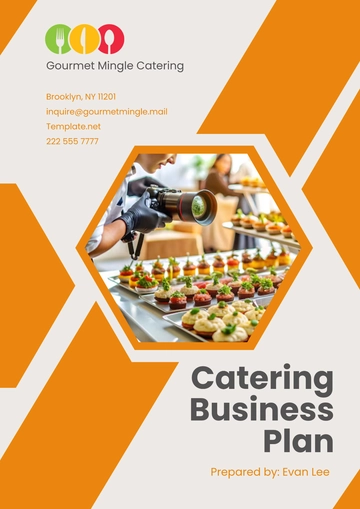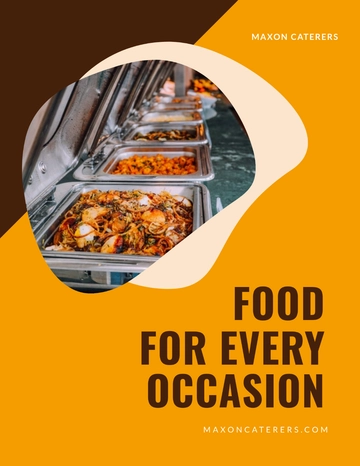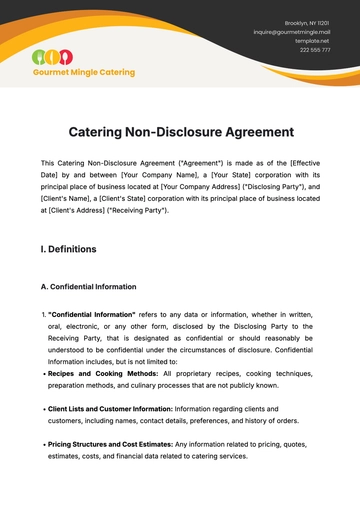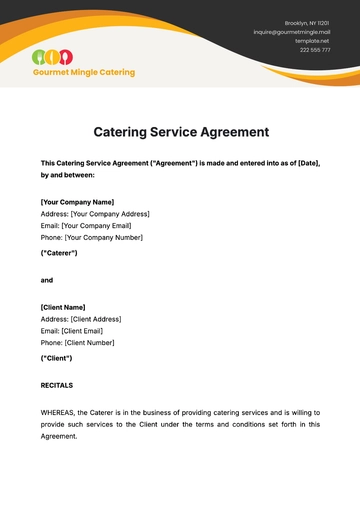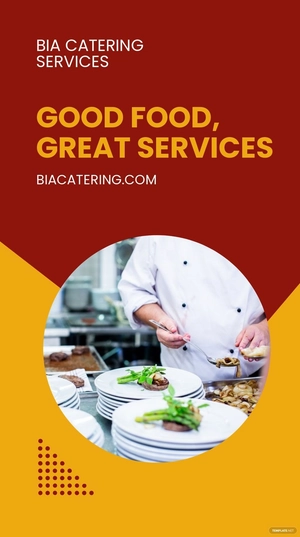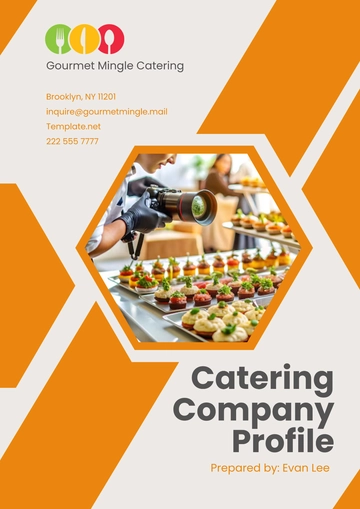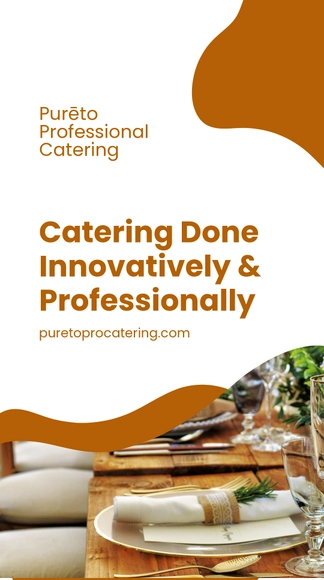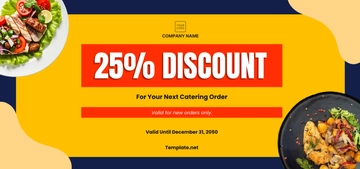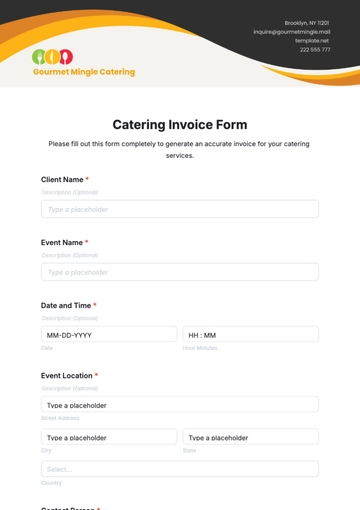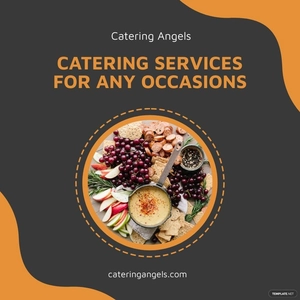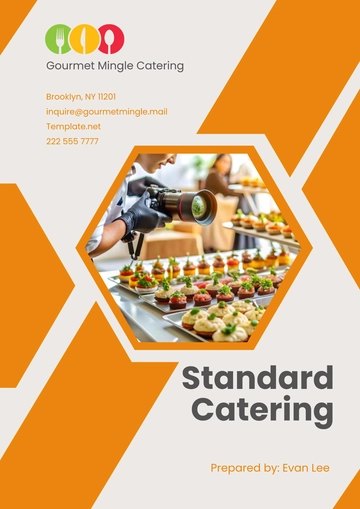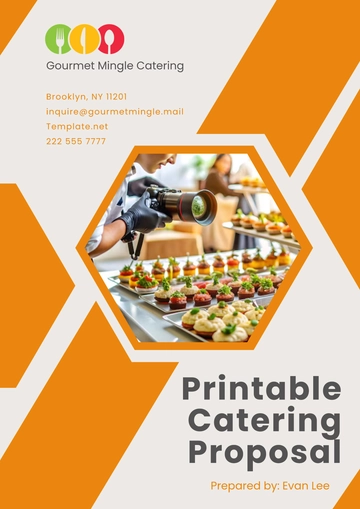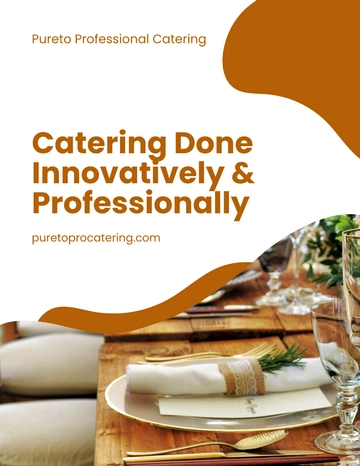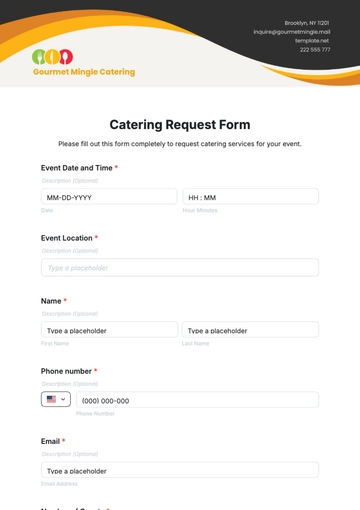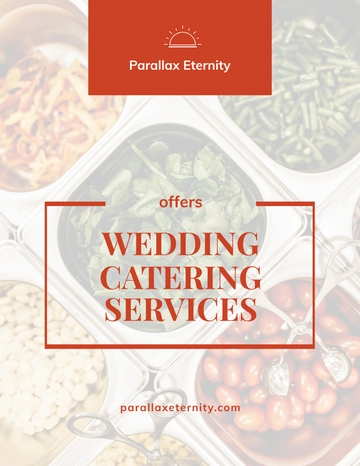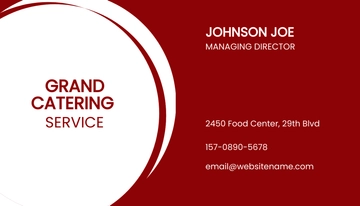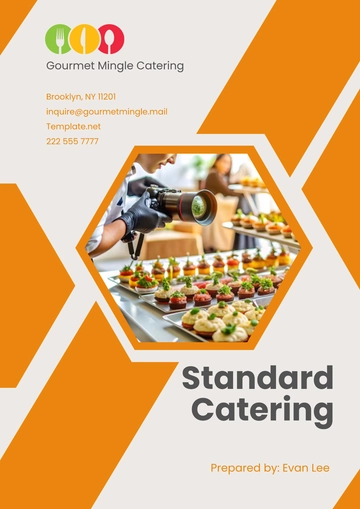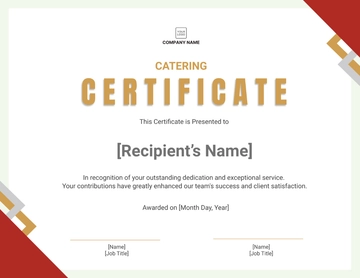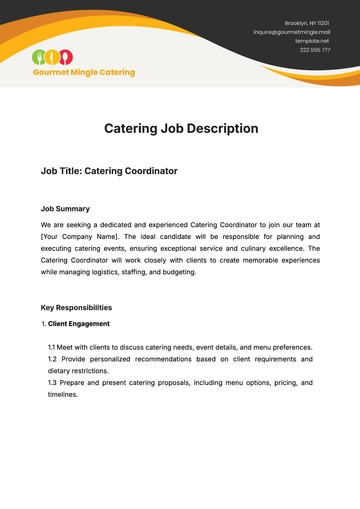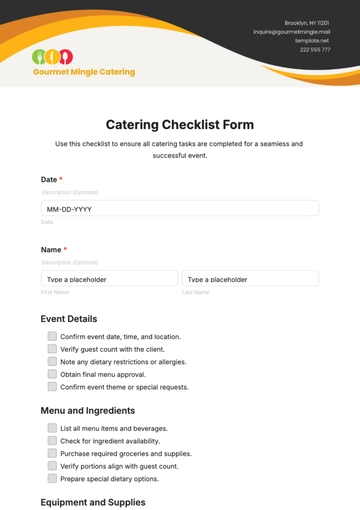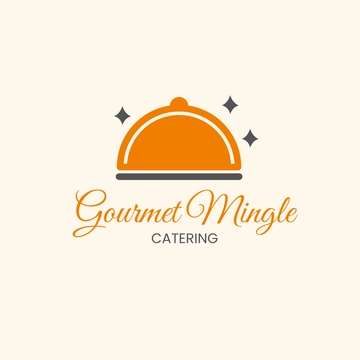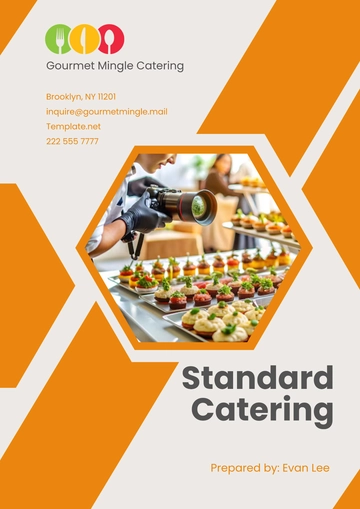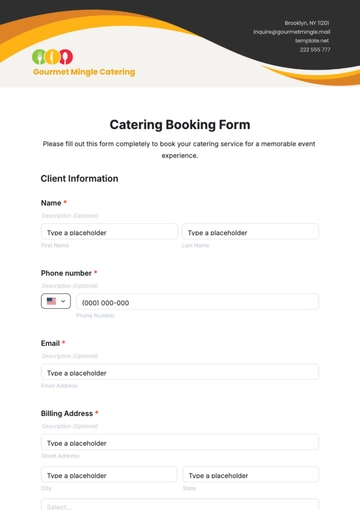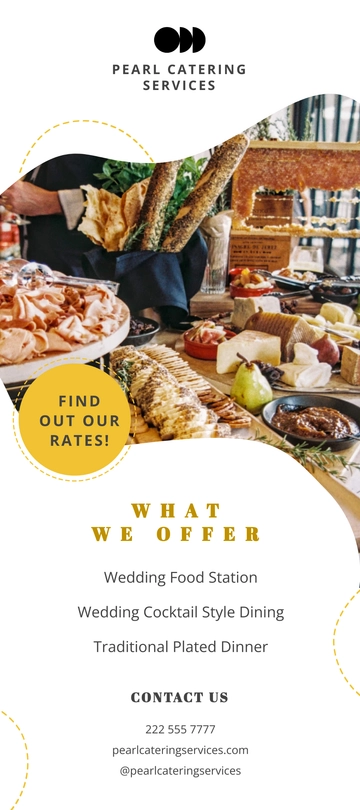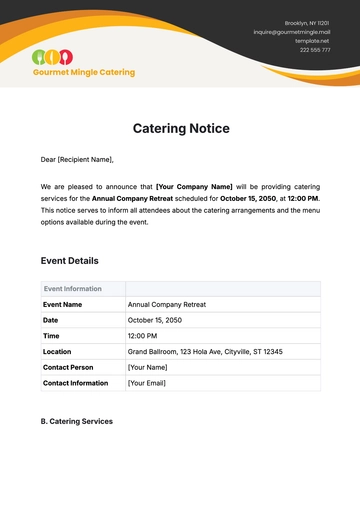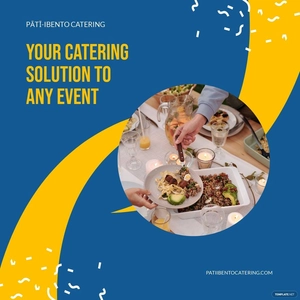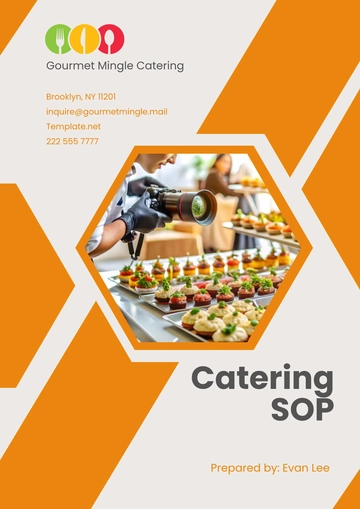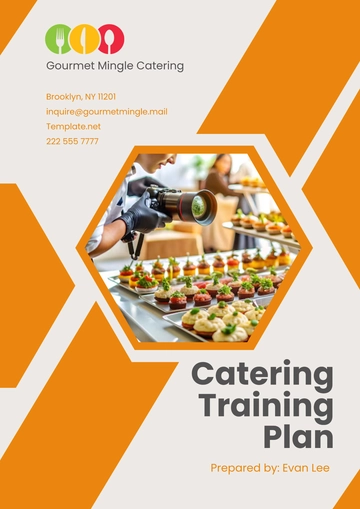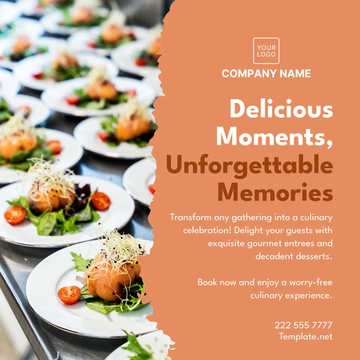Free Catering SOP
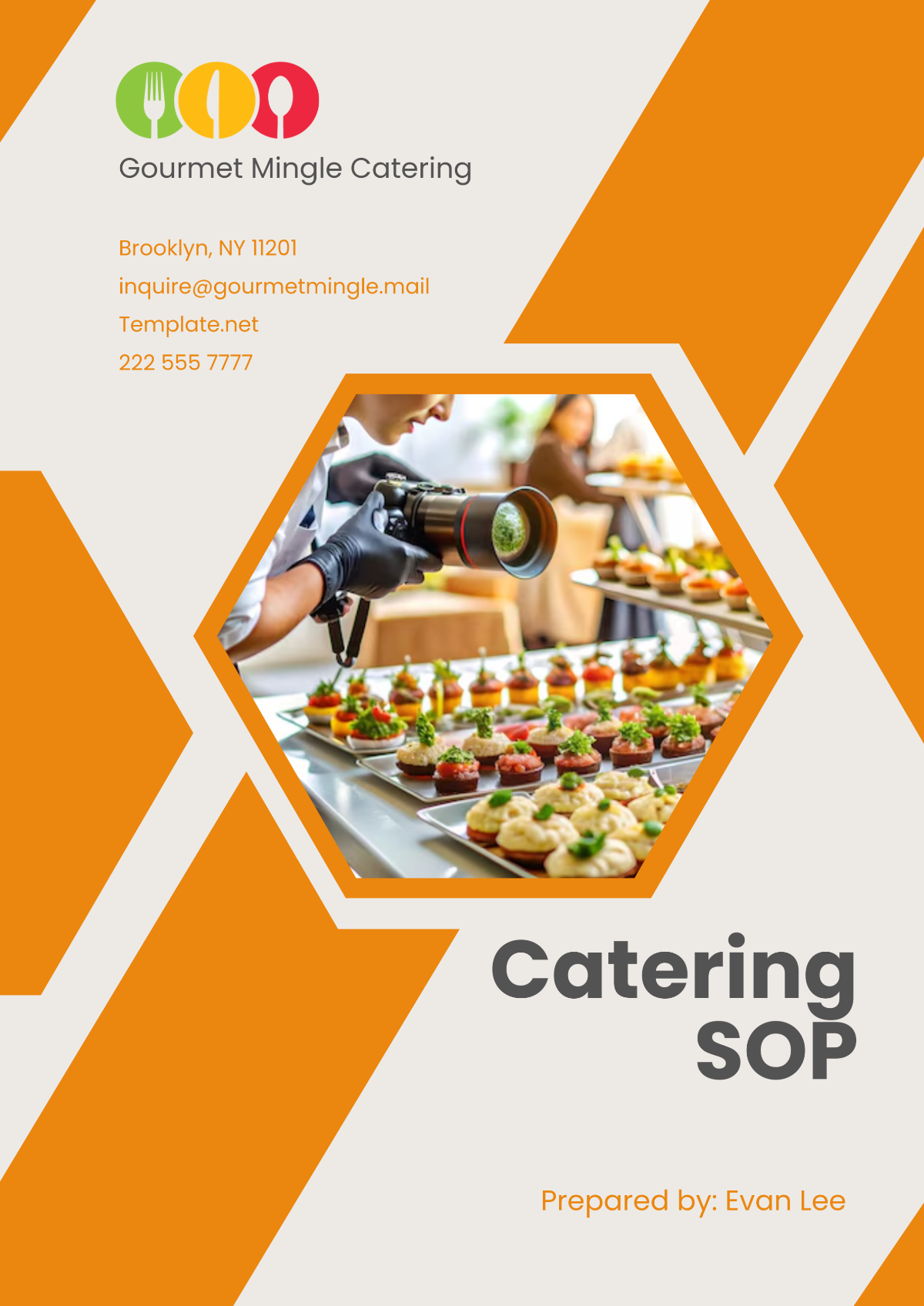
Issued by: [Your Company Name]
Effective Date: January 1, 2050
Version: 1.0
Reviewed and Updated: January 2055
I. Introduction
This Standard Operating Procedure (SOP) outlines the catering process at [Your Company Name]. It serves as a comprehensive guide that details every aspect of our catering operations, ensuring that we meet and exceed the expectations of our clients. Our goal is to provide high-quality food and exceptional service, contributing to memorable events. This document encompasses guidelines for planning, executing, and managing catering services, which are crucial for maintaining our reputation as a premier catering provider in the industry.
II. Purpose
The primary purpose of this SOP is to standardize the catering process within [Your Company Name]. By adhering to this document, we aim to ensure that every event is executed flawlessly, reflecting our commitment to quality and customer satisfaction. This SOP acts as a framework for employees, providing clear instructions that help minimize errors and enhance operational efficiency. Additionally, it serves as a training tool for new employees, ensuring they are equipped with the knowledge and skills necessary to deliver exceptional catering services.
III. Scope
This SOP encompasses all aspects of the catering service lifecycle, from the initial client inquiry through to post-event evaluations. It covers the following critical areas:
Client Consultation and Event Planning: Establishing a clear understanding of client needs and expectations.
Menu Design and Approval: Creating a customized menu that aligns with the client's vision and dietary requirements.
Food Preparation and Cooking Standards: Ensuring high-quality food preparation in compliance with safety regulations.
Event Setup and Onsite Service: Delivering professional and efficient service during the event.
Health and Safety Compliance: Adhering to all relevant health and safety regulations to guarantee food safety.
Post-Event Cleanup and Debrief: Conducting thorough cleanup and evaluations to improve future service delivery.
Billing and Invoicing: Ensuring transparent financial transactions and timely payments.
IV. Responsibilities
Every employee and contractor involved in catering operations has specific responsibilities outlined in this document. Understanding these roles is vital for maintaining service quality and operational efficiency.
A. Catering Manager
The Catering Manager is the central figure in coordinating catering events. Their responsibilities include:
Overseeing Operations: The Catering Manager will supervise all catering operations, ensuring that each event is planned and executed according to the standards set forth in this SOP. This involves constant communication with both staff and clients.
Client Coordination: They will liaise with clients to finalize event details, such as timelines, menu selections, and service styles, effectively managing client expectations throughout the planning process.
Staff Supervision: The Catering Manager will allocate specific responsibilities to catering staff based on the requirements of each event. This includes directing team members on-site to ensure seamless service.
Quality Control: They will be responsible for conducting quality checks on food and service standards, ensuring that every aspect of the event aligns with [Your Company Name]'s commitment to excellence.
B. Head Chef
The Head Chef plays a crucial role in the kitchen and is responsible for the following:
Kitchen Management: The Head Chef will oversee all kitchen operations, including food preparation, cooking, and presentation. They must ensure that the kitchen environment is organized, hygienic, and conducive to food safety.
Menu Development: They will collaborate with the Catering Manager to develop innovative menu options that cater to the client’s tastes and preferences while adhering to dietary restrictions. The Head Chef must stay updated with culinary trends and incorporate seasonal ingredients.
Inventory Management: The Head Chef will monitor inventory levels of ingredients and kitchen supplies, placing orders as necessary to ensure that the kitchen is well-stocked at all times. They must maintain relationships with suppliers to secure high-quality ingredients.
Quality Assurance: The Head Chef must conduct regular taste tests and quality checks to guarantee that all food items meet the expected standards of taste and presentation.
C. Event Staff
The Event Staff are the face of [Your Company Name] during events and must provide exemplary service. Their duties include:
Event Setup: Staff will be responsible for setting up dining areas, including arranging tables, chairs, and serving stations in accordance with the event plan. They must ensure that all equipment is functioning properly and that the setup aligns with the client's vision.
Food Service: During the event, the staff will serve food and beverages, attend to guest needs, and maintain a professional demeanor throughout the event. They must be attentive and responsive to any requests from guests.
Cleanup Duties: After the event, the Event Staff will perform post-event cleanup, ensuring that all areas are cleaned and returned to their original condition. This includes packing away equipment and disposing of any waste in compliance with local regulations.
Professionalism: Staff must maintain a high level of professionalism, including adhering to dress codes, communicating politely with guests, and presenting themselves as representatives of [Your Company Name].
D. Health and Safety Officer
The Health and Safety Officer is tasked with ensuring compliance with all health regulations. Their responsibilities include:
Compliance Checks: The Health and Safety Officer will conduct regular inspections of kitchen facilities and event venues to ensure adherence to food safety standards. This includes checking for proper food storage temperatures and sanitation practices.
Training and Education: They will provide ongoing health and safety training for all staff members, ensuring that everyone is aware of best practices for food handling, hygiene, and safety protocols.
Incident Management: In the event of any health or safety incidents, the officer will investigate the situation, document findings, and report them to the Catering Manager for further action.
Policy Updates: The Health and Safety Officer will keep the team updated on any changes to local health regulations and ensure that the company’s policies reflect current best practices.
V. Procedures
The procedures outlined in this SOP are essential for the successful execution of catering events. Each section provides detailed instructions to ensure consistency and quality in our services.
A. Client Consultation and Event Planning
1. Initial Inquiry and Consultation
1.1. When a client contacts [Your Company Name] for catering services, the Catering Manager or assigned event coordinator will schedule an initial consultation within [2] business days of the inquiry. This consultation may take place over the phone, through email, or in person, depending on the client's preferences and availability. This flexibility in communication channels demonstrates our commitment to client service.
1.2. During the consultation, a detailed discussion will take place regarding the event's purpose, guest count, location, and preferred services. The Catering Manager will gather information regarding any special dietary requirements, such as vegetarian, vegan, gluten-free, or allergen restrictions, as well as logistical considerations (e.g., electricity and water availability). This step is crucial for tailoring our offerings to meet the specific needs of the client.
1.3. A standard inquiry form, known as the "Catering Event Planning Form," must be completed during or after the consultation. This form will serve as a record of all the details discussed, ensuring nothing is overlooked as we move forward in the planning process.
2. Event Proposal and Estimate
2.1. Following the initial consultation, a formal proposal outlining the recommended services and an estimated cost will be prepared. The proposal will include various components such as:
Menu Options: Detailed descriptions of the proposed menu items, including potential variations based on seasonal ingredients, ensuring a diverse selection for the client.
Staffing Requirements: Information regarding the number of servers, bartenders, and chefs needed based on the event size and style.
Equipment Rentals: A list of any necessary equipment rentals, such as tables, chairs, linens, and cutlery, providing a comprehensive overview of all services offered.
Estimated Costs: A detailed breakdown of costs associated with labor, ingredients, and rental fees, ensuring transparency and clarity for the client.
2.2. The proposal must be sent to the client for approval within [3] business days. A follow-up consultation may be scheduled if adjustments are needed. This collaborative approach helps to ensure that the final proposal aligns perfectly with the client’s expectations.
2.3. To secure the booking, the Catering Manager will request a [50]% deposit based on the estimate. This deposit must be paid at least [30] days before the event date to confirm the reservation and begin preparations. It also serves as a commitment from both parties.
B. Menu Design and Approval
1. Customizing the Menu
1.1. The Head Chef will work closely with the Catering Manager and the client to create a customized menu that aligns with the client’s vision. This collaborative effort allows for a personalized experience that reflects the client's preferences, tastes, and dietary restrictions.
1.2. The menu items will be categorized into distinct sections, including starters, main courses, desserts, and beverages (both alcoholic and non-alcoholic options). By organizing the menu in this manner, clients can easily navigate their choices and make informed decisions.
1.3. Seasonal ingredients and locally sourced produce will be prioritized to ensure freshness and sustainability. The use of local ingredients not only enhances the flavor of the dishes but also supports local farmers and producers, which aligns with our company values.
1.4. The finalized menu must be approved by the client at least [14] days before the event. Any changes requested after this deadline may incur additional charges based on the availability of ingredients and kitchen capacity. This timeline ensures that the kitchen has sufficient time to prepare and procure necessary items.
2. Menu Tasting (Optional)
2.1. For events with [50] or more guests, [Your Company Name] offers an optional menu tasting session. This session allows the client to sample the proposed dishes and provide feedback before the event. The tasting must be scheduled no later than [30] days prior to the event date to allow for any adjustments.
2.2. The menu tasting will be conducted at [Your Company Name]'s kitchen or a designated venue, allowing the client to experience the quality of our offerings firsthand. This interaction not only builds trust with the client but also creates an opportunity for further discussion about their preferences.
C. Food Preparation and Cooking Standards
1. Food Safety and Quality Control
1.1. All food preparation will be conducted in compliance with local health department regulations. The Head Chef will ensure that all kitchen staff is trained in proper food handling techniques, including the importance of personal hygiene, cleanliness, and safe food storage practices. These standards are critical for preventing foodborne illnesses and ensuring guest safety.
1.2. Ingredients must be sourced from reputable suppliers who comply with food safety standards. Regular audits of suppliers will be conducted to verify that they adhere to the required quality and safety protocols.
1.3. A checklist for food preparation and cooking will be maintained, covering essential aspects such as ingredient freshness, cooking temperatures, and presentation standards. This checklist will serve as a valuable tool for staff to ensure consistency and quality in every dish prepared.
2. Meal Preparation Timeline
2.1. A detailed meal preparation timeline will be created for each event, outlining the schedule for food preparation, cooking, and plating. This timeline will ensure that everything is prepared in a timely manner, allowing for smooth service during the event.
2.2. The timeline will account for factors such as transportation time, cooking times, and any necessary breaks for staff. This meticulous planning will help mitigate any potential delays and ensure that food is served at optimal temperatures.
2.3. All food must be prepared on-site or in a certified kitchen, adhering to health and safety regulations. Meals that need to be transported to the event must be properly packed to maintain temperature control and prevent contamination.
D. Event Setup and Onsite Service
1. Pre-Event Setup
1.1. The Event Staff will arrive at the venue at least [2] hours before the event start time to allow for sufficient setup time. This advance arrival ensures that they can address any unforeseen issues that may arise, providing a buffer for problem-solving.
1.2. Setup will include arranging tables, chairs, and any necessary equipment according to the event plan. The staff will pay close attention to detail, ensuring that the layout is visually appealing and functional for guests.
1.3. The serving stations will be organized for efficiency and accessibility, allowing for a smooth flow of service during the event. Staff members will be trained on proper serving etiquette to ensure guests receive a high level of service.
2. Onsite Service
2.1. On the day of the event, the Catering Manager will conduct a final review of the setup and food presentation. This ensures that all elements align with the client’s specifications and expectations.
2.2. During the event, staff will be responsible for attending to guests, serving food and beverages, and addressing any requests promptly. Staff members will be trained to recognize and respond to cues from guests, maintaining a high standard of hospitality.
2.3. Continuous communication among team members is essential for efficient service. The Catering Manager will assign specific roles to staff to facilitate coordination, ensuring that all tasks are executed seamlessly.
3. Guest Interaction
3.1. Staff members will engage with guests in a friendly and professional manner, creating a welcoming atmosphere. Positive interactions can significantly enhance the overall guest experience and reflect well on [Your Company Name].
3.2. Any special requests or issues raised by guests must be addressed immediately. Staff will be trained to handle inquiries and concerns effectively, ensuring that guests feel valued and attended to.
E. Health and Safety Compliance
1. Health and Safety Regulations
1.1. [Your Company Name] will adhere to all local health and safety regulations, including those related to food preparation, service, and sanitation. This commitment to compliance ensures the safety of both staff and guests during events.
1.2. Regular training sessions will be conducted to educate all staff about the latest health and safety guidelines. This proactive approach helps to maintain a safe working environment and reduces the risk of health violations.
1.3. Personal protective equipment (PPE) such as gloves, aprons, and hairnets must be worn by all kitchen staff during food preparation. This practice minimizes the risk of contamination and aligns with health department standards.
2. Emergency Procedures
2.1. The Health and Safety Officer will develop a set of emergency procedures to be followed in the event of an accident or incident. Staff will be trained on these procedures to ensure they know how to respond effectively.
2.2. First aid kits must be readily available at all event venues, and designated staff members should be trained in basic first aid techniques. This preparedness can make a significant difference in handling emergencies.
F. Post-Event Cleanup and Debrief
1. Cleanup Procedures
1.1. After the event, the Event Staff will begin cleanup efforts immediately, ensuring that all areas are returned to their original condition. This includes removing any leftover food, packing equipment, and cleaning surfaces.
1.2. All waste will be disposed of according to local regulations, and recycling practices will be implemented whenever possible. This commitment to sustainability reflects [Your Company Name]’s values and social responsibility.
1.3. The Event Staff will complete a cleanup checklist to ensure that no tasks are overlooked. This checklist will help maintain consistency across events and ensure that staff members are accountable for their responsibilities.
2. Post-Event Review
2.1. A post-event debriefing will be held with the catering team to assess the event's success and identify areas for improvement. This reflective practice fosters a culture of continuous improvement within [Your Company Name].
2.2. The Catering Manager will compile feedback from both staff and clients, using this information to create an event report. This report will highlight client satisfaction, any issues encountered, and recommended improvements for future events.
2.3. Lessons learned from each event will be documented and shared with the team. This process encourages collaboration and helps to ensure that best practices are established for future catering services.
G. Billing and Invoicing
1. Final Invoice
1.1. After the event, the final invoice will be generated, reflecting the total costs, including labor, food, equipment rentals, and any additional services rendered. This invoice must be detailed to ensure transparency and clarity for the client.
1.2. The invoice will be sent to the client within [5] business days of the event's conclusion. Clients are advised that the remaining balance must be paid within [15] days to avoid late fees. Timely invoicing and payment are essential for maintaining healthy cash flow.
2. Late Payment Fees
2.1. Late payments will incur a fee of [$25] for each week beyond the due date. This policy encourages prompt payment and helps the company maintain its financial stability.
2.2. If payment is not received within [30] days, legal action may be taken to recover the debt. Clients will be informed of this policy upfront to ensure clarity regarding payment expectations.
3. Refunds and Cancellations
3.1. If the client cancels the event less than [14] days before the scheduled date, [Your Company Name] will retain the [50]% deposit as a cancellation fee. This policy helps to offset the costs incurred in preparing for the event.
3.2. Cancellations made prior to this will result in a full refund minus any incurred costs, providing flexibility for clients while protecting the company’s interests.
- 100% Customizable, free editor
- Access 1 Million+ Templates, photo’s & graphics
- Download or share as a template
- Click and replace photos, graphics, text, backgrounds
- Resize, crop, AI write & more
- Access advanced editor
Ensure consistency and quality with the Catering SOP Template from Template.net. This editable and customizable template provides a structured format for outlining standard operating procedures in your catering business. Use our Ai Editor Tool to personalize it, ensuring all team members adhere to best practices for exceptional service.
